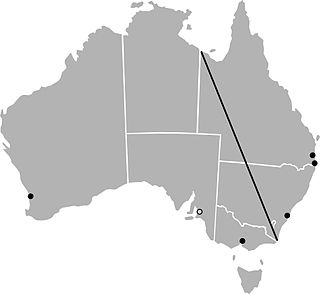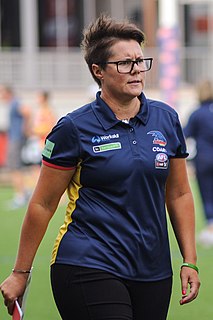
AFL Queensland (AFLQ) is the governing body of Australian rules football in Queensland. AFL Queensland has over 216,000 participants playing at all levels of football from the introductory NAB AFL Auskick program to the AFL Masters Competition. AFL Queensland covers 13 regions, 24 leagues and 159 clubs.

The NAB League Boys is an under-19 Australian rules football representative competition held in Australia. It is based on geographic regions throughout country Victoria and metropolitan Melbourne with each team representing twelve Victorian regions, while a thirteenth team from Tasmania was reintroduced in 2019. The competition is sponsored by National Australia Bank (NAB), having previously been sponsored by the Transport Accident Commission (TAC) since its inception.

Women's Australian rules football, is the female-only form of Australian rules football, generally with some modification to the laws of the game.

The Australian Football League (AFL) is the pre-eminent and only fully professional competition of Australian rules football. Through the AFL Commission, the AFL also serves as the sport's governing body and is responsible for controlling the laws of the game. Originally known as the Victorian Football League (VFL), it was founded in 1896 as a breakaway competition from the Victorian Football Association (VFA), with its inaugural season commencing the following year. The VFL, aiming to become a national competition, began expanding beyond Victoria to other Australian states in the 1980s, and changed its name to the AFL in 1990.

The AFL Hunter Central Coast is an Australian rules football competition in the Newcastle, Hunter Region and Central Coast regions of New South Wales.
The AFL Commission is the official governing body of the Australian Football League Limited (AFL), its subsidiaries and controlled entities. Richard Goyder has been chairman since 4 April 2017, replacing Mike Fitzpatrick.

Australian rules football is the most watched and attended sport and the second most participated code of football in Australia.
Women's Football Australia (WFA) was the governing body for the sport of Women's Australian rules football in Australia between 1991 and its dissolution in 2015. The organisation coordinated the Women's National Championship throughout its existence.

The "Barassi Line" is an imaginary line in Australia which approximately divides areas where Australian rules football and rugby league is the most popular football code. It was first used by historian Ian Turner in his "1978 Ron Barassi Memorial Lecture". Crowd figures, media coverage, and participation rates are heavily skewed in favour of the dominant code on both sides of the line.

Sport in the Australian Capital Territory refers to the various sports played in the Australian Capital Territory. Teams represent the ACT in the national leagues of several sports, although the rugby league and rugby union teams receive far more local coverage than any of the other teams and are considered the main sports of the territory. The Australian Institute of Sport was set up in 1981, where many Olympic and other athletes are trained.
The AFL Under-19 Championships is an annual Australian national underage representative championship in Australian rules football tournament. It is seen as one of the main pathways towards being drafted into a team in the fully professional Australian Football League (AFL).
The Australian Football League stages the highest-level senior Australian rules football competition in the country.
AFL Quebec is a 9-a-side Australian football competition formerly known as the Eastern Canadian Australian Football League or ECAFL. The league has both a men's and women's division and consists of teams from Montréal and its surrounding areas. Players from the current regular season teams are eligible to play representative 18-a-side football for the men's team the Québec Saints or the women's team the Montréal Angels. The Saints and Angels participate in the United States AFL National Championships Tournament, the Saints having previously participated in the AFL Ontario Division 2 competition from 2008–10.

AFL Women's (AFLW) is Australia's national semi-professional Australian rules football league for female players. The first season of the league in February and March 2017 had eight teams; the league expanded to 10 teams in the 2019 season, 14 teams in 2020 and 18 teams in 2022. The league is run by the Australian Football League (AFL) and is contested by each of the clubs from that competition. The reigning premiers are Adelaide.

Melissa Hickey is a former Australian rules footballer who played for the Melbourne Football Club and the Geelong Football Club in the AFL Women's (AFLW). She served as Geelong captain in the club's first two AFL Women's seasons. She also played in the Victorian Women's Football League/VFL Women's for eleven seasons, representing the St Albans Spurs, Darebin and Geelong. In the VWFL/VFLW, Hickey won seven premierships, represented Victoria on three occasions and featured in the VFL Women's team of the year.

Rebecca 'Bec' Goddard is an Australian rules football coach who served as the head coach of the Adelaide Football Club in the AFL Women's competition (AFLW) between 2017 and 2018, winning the 2017 AFL Women's Grand Final. She was assistant coach of the University of Canberra Capitals in the Women's National Basketball League (WNBL) in 2018/19, when it won the league championship. From the 2022/23 AFL Women's season, Goddard will serve as the inaugural coach of the Hawthorn team.
The NAB AFL Women's Under-18 Championships are the annual national Australian rules football championships for women players aged 18 years or younger. The competition is seen as one of the main pathways towards being drafted into a team in the professional AFL Women's competition (AFLW). Originally known as the AFL Youth Girls National Championship, the competition has teams of players representing their states and territories in a round robin tournament. The tournament is currently sponsored by the National Australia Bank. The winner of the 2019 tournament was Vic Metro.
Jordan Zanchetta is an Australian rules footballer who played for the Brisbane Lions in the AFL Women's.
The NAB League Girls is an under-19 Australian rules football representative competition held in Australia. It is based on geographic regions throughout country Victoria and metropolitan Melbourne with each team representing twelve Victorian regions, while a thirteenth team from Tasmania was introduced in 2019. The competition is sponsored by National Australia Bank (NAB), having previously been sponsored by the Transport Accident Commission (TAC) since its inception.

Tyla Hanks is an Australian rules footballer playing for Melbourne in the AFL Women's (AFLW). An inside midfielder, she played junior football in the TAC Cup Girls and VFL Women's, and competed at four AFL Women's Under 18 Championships. Hanks was recruited by Melbourne with pick 6 in the 2018 AFLW draft and debuted in the opening round of the 2019 season.











